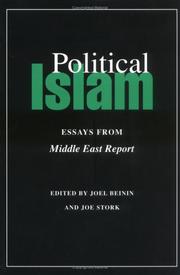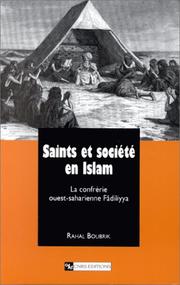| Listing 1 - 10 of 13 | << page >> |
Sort by
|
Book
ISBN: 1443896578 9781443896573 9781443890151 1443890154 Year: 2016 Publisher: Newcastle upon Tyne, England : Cambridge Scholars Publishing,
Abstract | Keywords | Export | Availability | Bookmark
 Loading...
Loading...Choose an application
- Reference Manager
- EndNote
- RefWorks (Direct export to RefWorks)
Islam and politics --- Arab Spring, 2010 --- -Islam and politics --- Islam and politics - Africa, North
Book
ISBN: 9781108488662 9781108771160 9781108726863 Year: 2020 Publisher: Cambridge Cambridge University Press
Abstract | Keywords | Export | Availability | Bookmark
 Loading...
Loading...Choose an application
- Reference Manager
- EndNote
- RefWorks (Direct export to RefWorks)
What drives the rise and fall of jihadist movements in North Africa and the Sahel ? This book offers a novel explanation of jihadist mobilization in this critical region and around the world, treating jihadist organizations as internally diverse political coalitions. These coalitions, the author argues, routinely negotiate and compromise with political forces around them, even as blocs within the coalitions negotiate, argue, and even fight with one another. Rather than treating jihadists as single-minded fanatics, the volume discusses them as nuanced political actors - who are, moreover, sometimes forced to accommodate the interests of sophisticated political actors in the societies they enter. The volume offers insight into key recent events in Mali, Libya, and elsewhere in the region, examining the northern Malian uprising of 2012 and its aftermath, the emergence and collapse of Islamic State territories in Libya, and the deterioration of security and governance in central Mali and northern Burkina Faso. Based on fieldwork in the region, jihadist primary source documents, and a detailed examination of historical and political context, the volume sheds new light on a widely misunderstood part of Africa.
Book
ISBN: 0190942444 9780190942403 0190942428 9780190942410 0190942401 0190942436 019094241X Year: 2019 Publisher: New York : Oxford University Press,
Abstract | Keywords | Export | Availability | Bookmark
 Loading...
Loading...Choose an application
- Reference Manager
- EndNote
- RefWorks (Direct export to RefWorks)
The conservative, literalist Islamist current known as Salafism is often synonymous with extremism and militancy. In fact, Salafism is an adaptive, diverse and dynamic outlook that has emerged as a major social and political force across the Middle East, especially in the countries of the Arab Maghreb--Mauritania, Morocco, Algeria, Tunisia and Libya--a vitally important region that impacts the security and politics of Europe, sub-Saharan Africa and the broader Middle East. Through extensive interviews and fieldwork, Middle East scholars Frederic Wehrey and Anouar Boukhars explore the many roles and manifestations of Salafism in the Maghreb, to include its relationship with the Maghreb's ruling regimes, with competing Islamist currents, increasingly youthful populations, and communal groups like tribes and ethno-linguistic minorities. Particular attention is paid to how the boundaries between different Salafi currents--pro-regime "quietists," politically active "politicos" who participate in elections, and militant jihadists like al-Qaeda and the Islamic State, is increasingly blurred, demonstrating how seemingly immutable Salafi ideology is often shaped by local contexts and opportunities. Similarly, the authors show how Maghrebi Salafism is uniquely reflective of each country's political institutions, history, and social makeup and how the much-touted notion of Salafism as a monolithic Saudi or Gulf "export" is undermined by local realities. Informed by rigorous research, deep empathy, and unparalleled access to Salafi adherents, clerics, politicians, and militants, Salafism in the Maghreb offers a definitive account of this important Islamist current that is at once granular and accessible.
Salafīyah - Africa, North --- Islam and politics - Africa, North --- Africa, North - Politics and government - 21st century --- Salafīyah. --- Salafiyya --- Islamic sects --- Salafīyah --- Islam and politics --- Africa, North
Book
ISBN: 9780367234867 Year: 2021 Publisher: Abingdon, UK : Routledge,
Abstract | Keywords | Export | Availability | Bookmark
 Loading...
Loading...Choose an application
- Reference Manager
- EndNote
- RefWorks (Direct export to RefWorks)
This book provides a pioneering and original study of the regional effects of political Islam. It sets out the multifaceted interactions between Islam and politics in the Middle East and North Africa (MENA) region, focussing in particular on the so-called Islamic State (IS) organization in its broad discussion of political Islam. Utilizing a trans-disciplinary perspective, the book interacts with social constructivism and complex realism theories to analyse the clash between the modern notion of the state and that of identity in the region. Looking at issues such as the rise of IS and its attempts to establish a caliphate, the book offers three different, yet complementary, levels of analysis for its discussion. These being : Regional (dis)order, the erosion of state power and its boundaries, and the role of non-state actors in shaping the politics of the MENA region. Each of these levels are addressed in detail in turn in order to build a comprehensive picture of state and political Islam in the Arab core of the MENA region. What emerges is a comprehensive analysis of the interlinked relationships between political and Islamic elements of Arab polities and societies.
Book
ISBN: 9782757853832 275785383X Year: 2015 Volume: 763 Publisher: Paris Points
Abstract | Keywords | Export | Availability | Bookmark
 Loading...
Loading...Choose an application
- Reference Manager
- EndNote
- RefWorks (Direct export to RefWorks)
Dans cet ouvrage, publié pour la première fois en 1992, Olivier Roy énonce une thèse en apparence paradoxale : l'essor des mouvements islamistes signe l'échec de l'islam politique. Si les fondamentalistes conçoivent le Coran comme un programme de gouvernement et croient possible de construire une société fondée sur ses préceptes en les imposant depuis l'Etat, les expériences analysées dans ce livre, en Iran, en Afghanistan et ailleurs, montrent que le concept d'Etat islamique est contradictoire et impossible à réaliser. Vingt ans plus tard, le revers des partis islamistes qui ont accédé au pouvoir après le Printemps arabe confirme la justesse de cette analyse. Mais cet ouvrage précurseur invite surtout à penser autrement qu'à travers un prisme essentialiste la vague de néo-fondamentalisme que connaissent nombre de pays musulmans et la recrudescence de l'activisme djihadiste à travers le monde. Postface inédite de l'auteur.

ISBN: 1860640982 9781860640988 Year: 1997 Publisher: London Tauris
Abstract | Keywords | Export | Availability | Bookmark
 Loading...
Loading...Choose an application
- Reference Manager
- EndNote
- RefWorks (Direct export to RefWorks)
Political philosophy. Social philosophy --- Political systems --- Islamic fundamentalism --- Religion and politics --- Islam and politics --- Middle East --- Africa, North --- Politics and government --- Religion and politics - Middle East --- Islam and politics - Middle East --- Islam and politics - Africa, North --- Middle East - Politics and government --- Africa, North - Politics and government
Book
ISBN: 2876861615 9782876861619 Year: 1993 Publisher: Paris : F. Bourin,
Abstract | Keywords | Export | Availability | Bookmark
 Loading...
Loading...Choose an application
- Reference Manager
- EndNote
- RefWorks (Direct export to RefWorks)
Algeria --- Tunisia --- Morocco --- Africa, North --- Algérie --- Tunisie --- Maroc --- Afrique du Nord --- Politics and government --- Social conditions --- Politique et gouvernement --- Conditions sociales --- Islam and politics --- Algérie --- Social conditions. --- Politics and government. --- Islam and politics - Africa, North --- Africa, North - Politics and government
Book
ISBN: 2213618879 9782213618876 Year: 2004 Publisher: Paris : Fayard,
Abstract | Keywords | Export | Availability | Bookmark
 Loading...
Loading...Choose an application
- Reference Manager
- EndNote
- RefWorks (Direct export to RefWorks)
Democracy --- Islam and politics --- Démocratie --- Islam et politique --- Africa, North --- Afrique du Nord --- Politics and government --- Politique et gouvernement --- Islam and state --- Elite (Social sciences) --- History --- Démocratie --- Democracy - Africa, North --- Islam and politics - Africa, North --- Islam and state - Africa, North --- Elite (Social sciences) - Africa, North - History - 20th century --- Africa, North - Politics and government --- Africa, North - History - 20th century --- ISLAM ET POLITIQUE --- INTEGRISME ISLAMIQUE --- MOUVEMENTS RELIGIEUX --- MAGHREB --- AFRIQUE DU NORD --- 20 IEME SIECLE --- ISLAMISME --- POLITIQUE ET GOUVERNEMENT
Book
ISBN: 2865372170 9782865372171 Year: 1988 Publisher: Paris Karthala
Abstract | Keywords | Export | Availability | Bookmark
 Loading...
Loading...Choose an application
- Reference Manager
- EndNote
- RefWorks (Direct export to RefWorks)
-Islam and politics --- -Etnografie: Afrika --- Islam and politics --- Islam --- #SBIB:316.331H300 --- #SBIB:39A10 --- #SBIB:39A73 --- #SBIB:39A77 --- Godsdienst en samenleving: algemeen --- Antropologie: religie, riten, magie, hekserij --- Etnografie: Afrika --- Etnografie: Noord-Afrika en het Midden-Oosten --- Africa, North --- Politics and government. --- National movements --- Sociology of culture --- Maghreb --- Islamic fundamentalism --- Politics and government --- Islam - Africa, North --- Islam and politics - Africa, North --- Islamic fundamentalism - Africa, North --- Africa, North - Politics and government --- Africa, North - Politics and government - 1960 --- MOUVEMENTS RELIGIEUX --- ISLAMISME --- MAGHREB

ISBN: 2271056950 9782271056955 2271078431 Year: 1999 Publisher: Paris : CNRS Editions,
Abstract | Keywords | Export | Availability | Bookmark
 Loading...
Loading...Choose an application
- Reference Manager
- EndNote
- RefWorks (Direct export to RefWorks)
Dans l’Ouest saharien ; l’islam confrérique a constitué dès la fin du XVIIe siècle un phénomène qui a dépassé par son impact la dimension strictement religieuse. La mise en perspective de la confrérie Fâdiliyya, dont il est question ici, permet de connaître le fonctionnement et le rôle d’un islam très socialement incarné et actif, ainsi que les formes, les représentations, les pratiques et les stratégies d’un ordre mystique. Le modèle de la sainteté, la production du social et du politique par le religieux, les rapports entre les leaders confrériques et les autorités politiques, la gestion du pouvoir et de l’espace et les processus de succession sont les questions centrales traitées dans ce livre. Au-delà de l’espace ouest-saharien, ce travail apporte, par son approche théorique, une contribution à l’histoire et à la fonction du soufisme et de la sainteté.
Sufism --- Religious life --- Islam and politics --- Islamic monasticism and religious orders --- Islam --- Social aspects --- Wuld Māmīn, Muḥammad Fāḍil, --- Influence --- Religion --- Philosophy & Religion --- Sufism - Africa, North --- Religious life - Islam --- Islam and politics - Africa, North --- Islamic monasticism and religious orders - Sahara --- Sufism - Sahara --- Islam - Social aspects - Sahara --- Wuld Māmīn, Muḥammad Fāḍil, - approximately 1795-1868 - Influence --- saints --- Sahara occidental --- Mauritanie --- religiosité musulmane --- colonialisme --- ordre colonial --- Fâdiliyya --- Wuld Māmīn, Muḥammad Fāḍil, - approximately 1795-1868
| Listing 1 - 10 of 13 | << page >> |
Sort by
|

 Search
Search Feedback
Feedback About UniCat
About UniCat  Help
Help News
News